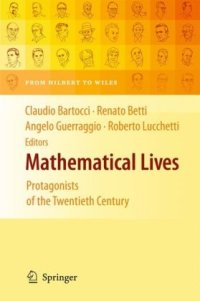
Ebook: Mathematical lives: Protagonists of the twentieth century from Hilbert to Wiles
Author: Umberto Bottazzini (auth.) Claudio Bartocci Renato Betti Angelo Guerraggio Roberto Lucchetti (eds.)
- Tags: History of Mathematics, History of Computing, Algebra, Game Theory Economics Social and Behav. Sciences, Mathematical Logic and Foundations, Probability Theory and Stochastic Processes
- Year: 2011
- Publisher: Springer-Verlag Berlin Heidelberg
- Edition: 1
- Language: English
- pdf
Steps forward in mathematics often reverberate in other scientific disciplines, and give rise to innovative conceptual developments or find surprising technological applications. This volume brings to the forefront some of the proponents of the mathematics of the twentieth century, who have put at our disposal new and powerful instruments for investigating the reality around us. The portraits present people who have impressive charisma and wide-ranging cultural interests, who are passionate about defending the importance of their own research, are sensitive to beauty, and attentive to the social and political problems of their times. What we have sought to document is mathematics’ central position in the culture of our day. Space has been made not only for the great mathematicians but also for literary texts, including contributions by two apparent interlopers, Robert Musil and Raymond Queneau, for whom mathematical concepts represented a valuable tool for resolving the struggle between ‘soul and precision.’
Steps forward in mathematics often reverberate in other scientific disciplines, and give rise to innovative conceptual developments or find surprising technological applications. This volume brings to the forefront some of the proponents of the mathematics of the twentieth century, who have put at our disposal new and powerful instruments for investigating the reality around us. The portraits present people who have impressive charisma and wide-ranging cultural interests, who are passionate about defending the importance of their own research, are sensitive to beauty, and attentive to the social and political problems of their times. What we have sought to document is mathematics’ central position in the culture of our day. Space has been made not only for the great mathematicians but also for literary texts, including contributions by two apparent interlopers, Robert Musil and Raymond Queneau, for whom mathematical concepts represented a valuable tool for resolving the struggle between ‘soul and precision.’